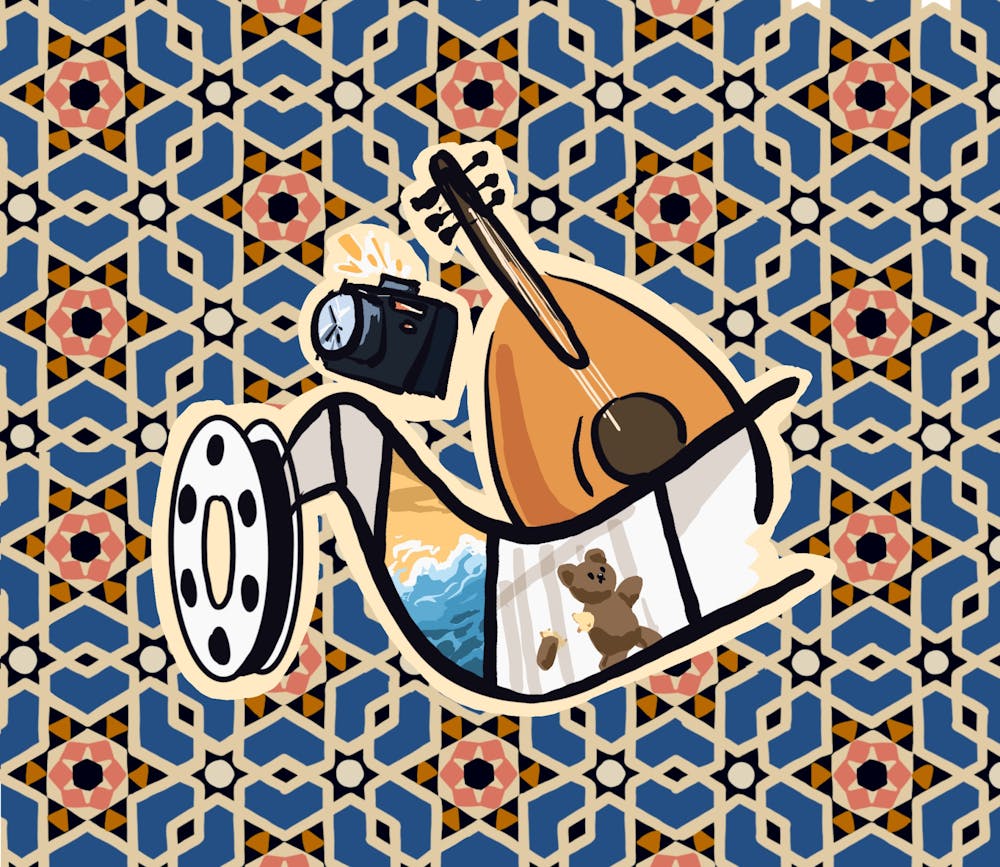Media to enjoy this Arab American Heritage month

This month is Arab American Heritage Month — so what better time to highlight media created by and about the Arab world? Here are some of the best works by Arab filmmakers, musicians and writers that showcase the diversity and complexity of Arab experiences.
“The Silences of the Palace” (dir. Moufida Tlatli)
When “The Silences of the Palace” debuted in 1994, it shifted cinematic landscapes. This Tunisian classic explores the life of Alia, a wedding singer revisiting the palace of her childhood, interspersing her memories of growing up under a deeply stratified social order. Praised for its strong feminist undertones, the film addresses class hierarchy and women’s autonomy in a postcolonial setting. “The Silences of the Palace” garnered numerous international awards and established Tlatli as one of the most influential Arab female directors in the region’s history.
“Five Broken Cameras” (dir. Emad Burnat and Guy Davidi)
This searing 2011 documentary immerses viewers in life within the West Bank village of Bil’in. Using five personal video cameras — several of which were damaged by conflict — Burnat captures protests and everyday realities under military occupation. “Five Broken Cameras” earned an Academy Award nomination for Best Documentary Feature, bringing international recognition to Palestinian storytelling and resilience. Despite its heavy subject matter, the documentary shines with moments of hope, community and perseverance.
“Homeland: Iraq Year Zero” (dir. Abbas Fahdel)
This two-part documentary chronicles life in Iraq before and after the 2003 U.S. invasion. The first part, “Before the Fall,” depicts ordinary routines marked by an impending sense of change, while the second part, “After the Battle,” reveals the profound aftermath of war. Lauded for its intimate, almost familial perspective, “Homeland: Iraq Year Zero” is a thorough examination of how conflict reshapes not just nations, but everyday lives. It’s a must-watch for anyone interested in the human side of major geopolitical events.
“Wahdon” by Fairuz
Fairuz, often called the “Jewel of Lebanon,” released “Wahdon” in 1979 at the height of her popularity. Composed by the Rahbani Brothers, this album balances poetic lyrics with sweeping orchestral arrangements that showcase Fairuz’s timeless vocals. “Wahdon” includes tracks that capture the dreamy romanticism of her music while also reflecting a resilience forged against the backdrop of Lebanon’s civil war. Fairuz remains a cultural icon whose work has transcended generations and borders, making this album a cornerstone of modern Arab music.
“Taqbir” by Taqbir
Angry, loud and unapologetically rebellious, Moroccan band Taqbir’s self-titled album channels the raw energy of punk into a sharp critique of societal norms. Recorded in a flurry of gritty guitar riffs and defiant vocals, it stands out as a fierce statement in a musical landscape that often favors polished pop and traditional ballads. Grounded in themes of personal freedom and cultural identity, “Taqbir” offers a stark reflection on what it means to resist expectations in conservative settings. It’s an invigorating listen for punk fans and anyone seeking a jolt of unfiltered honesty in their playlist.
“Palace Walk” by Naguib Mahfouz
Egyptian novelist Naguib Mahfouz was the first Arabic-language writer to win the Nobel Prize in Literature, and “Palace Walk” is one of his best-known works. It’s the first volume of his Cairo Trilogy, charting the story of a family in early 20th-century Egypt. Beyond its critical acclaim, “Palace Walk” is beloved for its vivid depictions of Cairo’s bustling streets and the intricate dynamics between tradition and modernity. Mahfouz’s characters feel strikingly real, offering readers a nuanced portrait of Egyptian society during a period of sweeping change.
“Watch Us Dance” by Leïla Slimani
The sequel to her earlier novel “In the Country of Others,” “Watch Us Dance” continues Leïla Slimani’s exploration of Morocco’s complex journey post-independence. Set in the 1960s and ’70s, the story follows a family navigating political turmoil and shifting social norms, highlighting themes of gender, identity and belonging. An award-winning writer known for incisive prose, Slimani uses her characters’ interconnected stories to paint a portrait of Morocco at a cultural crossroads. “Watch Us Dance” balances deeply personal narratives with broader historical forces, making it both intimate and universally resonant.
“Orientalism” by Edward Said
Though not a novel or a film, Edward Said’s “Orientalism” is a foundational text for understanding how the Western world has historically represented and perceived the Middle East. Published in 1978, it challenges and deconstructs cultural stereotypes, provoking readers to reflect on power dynamics in cross-cultural encounters. “Orientalism” remains highly influential in academic and political circles, shaping conversations around colonialism, cultural representation and identity.
More from The Rice Thresher

Night Market brings Taiwanese tradition to Ray’s Courtyard
Colorful strings of paper lanterns and glowing lights hung over Ray’s Courtyard amid bustling games April 13, as the Rice Taiwanese Association hosted their annual Night Market.

Meet the Magisters: Fabiola López-Durán and Carlos Martínez-Rivera on architecture, wine and student bonds
Behind an unassuming brick exterior lies abstract art, overflowing bookshelves and handcrafted wood furniture. Floor-to-ceiling windows bathe the home of Fabiola López-Durán and Carlos Martínez-Rivera in natural light.

Study Abroad Photo Contest spotlights global experiences
For the first time since the Covid-19 pandemic, students gathered in the Ley Student Center to celebrate global experiences through photography.

Please note All comments are eligible for publication by The Rice Thresher.